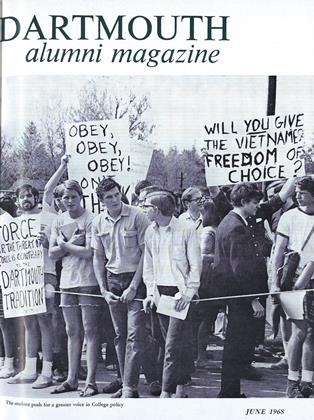Student agitation over the place of ROTC in the curriculum of the College was undoubtedly the main stimulus for the May 9 vote of the Executive Committee of the Faculty: "That the Committee on Organization and Policy be asked to report to the Executive Committee on the compatibility of the ROTC programs with the educational objectives of the College."
It is expected that the committee, after detailed study and meetings with students and others representing all points of view, will present its report to the Trustees no later than January.
In a parallel action, the Executive Committee also made clear the faculty's determination that orderly processes of the College will be protected and preserved, both in deciding policy and in assuring the right to dissent. This vote stated: "Dartmouth College prizes and defends the right of free speech, and the freedom of the individual to make his own decisions, while at the same time recognizing that such freedom exists in the context of law and of responsibility for one's actions. The exercise of these rights must not deny the same rights to any other individual. The College therefore both fosters and protects the rights of individuals to express their dissent against representatives of controversial ideas or policies. Protest or demonstration shall not be discouraged, so long as neither force nor the threat of force is used, and so long as the orderly processes of the College are not deliberately obstructed. Violations of these, the most basic principles of a free academic community, by faculty or students will be treated as a most serious violation of college regulations."
As another response to student action, the Trustees in April voted to refer an Interclass Council petition to the Trustees Planning Committee "with the recommendation that the Committee consider sponsoring and organizing a comprehensive study of campus life and opportunities for student participation in the responsible government of the College."
 View Full Issue
View Full Issue
More From This Issue
-
 Feature
FeatureRETIRING FACULTY AND STAFF
June 1968 -
 Feature
FeatureThe Black Student at Dartmouth
June 1968 By Wally Ford '70 -
 Feature
FeatureVox Clamantis 1968
June 1968 By Chris Kern '69 -
 Feature
FeatureFour Steps Forward in Biology
June 1968 By PROF. RAYMOND W. BARRATT. -
 Feature
FeatureShark Authority
June 1968 -
 Feature
FeatureHeart Specialist
June 1968







